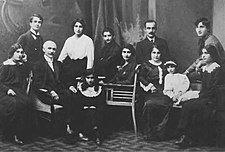Hovhannes Tumanyan (Armenian: Հովհաննես Թումանյան) (February 19 [O.S. February 7] 1869 – March 23, 1923) was anArmenian writer and public activist. He is considered to be the national poet of Armenia.[1]
Tumanyan wrote poems, quatrains, ballads, novels, fables, critical and journalistic articles.[2] His work was mostly written in realisticform, often centering on everyday life of his time.[1] Born in the historical village of Dsegh in the Lori region, at a young age Tumanyan moved to Tiflis, which was the center of Armenian culture under the Russian Empire during the 19th and early 20th centuries.[3] He soon became known to the wide Armenian society for his simple but very poetic works.
Many films and animated films have been adapted from Tumanyan's works. Two operas: Anush (1912) by Armen Tigranian andAlmast (1930) by Alexander Spendiaryan, were written based on his works.
Biography[edit]
Hovhannes Tumanyan was born on February 19, 1869 in the village of Dsegh, Tiflis Governorate,Russian Empire (now in Lori Province, Armenia).[2]
His father, Aslan (1839–1898), was the village priest known by the name Ter-Tadevos. He was an offspring of an Armenian princely family of Tumanyan, branch of the famous royal house of Mamikonianthat settled in Lori in 10th–11th centuries from their original feudal fief of Taron.
His mother, Sona (1842–1936), an avid storyteller with a particular interest in fables. Young Tumanyan was the oldest of eight children; his siblings were Rostom (1871–1915), Osan (1874–1926), Iskuhi (1878–1943), Vahan (1881–1937), Astghik (1885–1953), Arshavir (1888–1921), Artashes (1892–1916).[4]
From 1877–1879, Tumanyan attended the parochial school of Dsegh. From 1879–1883 he went to a school in Jalaloghly.[5] Tumanyan moved to Tiflis in 1883, where he attended the Nersisyan School from 1883–1887.[2] Tumanyan's wrote his first poem at the age of 12, while studying in Jalaloghly school. He lived at the teacher's house for a while and was in love with teacher's daughter Vergine.[5] Since 1893, Tumanyan worked for Aghbyur, Murtch, Hasker and Horizon periodicals and also was engaged in public activism.[2]
Political and public activism
arrested twice.[2] Tumanyan also deeply criticized the Georgian–Armenian War of 1918.[2] Tumanyan was also actively engaged in preaching the Gospel. As he put in one of his verses " There is only one way of salvation; through Jesus Christ abiding inside every one of us".
In October 1914 Tumanyan joined the "Committee for Support of War Victims", which later helped Armenian Genocide refugees settled inEtchmiadzin.[9]
Literary work
Tumanyan's word is simple, natural and poetically inspired at the same time. It is not by mere chance that dozens of phrases and expressions from Tumanyan's works have become a natural part of people's everyday language, their sayings, adages, and maxims.[1]
Tumanyan is usually regarded in Armenian circles as "All-Armenian poet". He earned this title when the Catholicos of Armenia had ordered that Armenian refugees from the west not enter certain areas of his church and house, since he is considered to be "The Catholicos of all Armenians". Tumanyan in response decried that decision claiming that the refugees could seek relief in the Catholicos' quarters under order of "The Poet of all Armenians".
He created lyrics, fables, epic poems and translations into Armenian of Byron, Goethe and Pushkin.[10]
Tumanyan's most famous works include:
Legacy
- In Armenia
- Tumanyan's native village of Dsegh was renamed Tumanyan in his honor from 1938–1969.[11]
- In 1951, the village of Dzagidzor of Lori Province was renamed Tumanyan
- Pedagogical University of Vanadzor
- Armenian State Puppet Theater in Yerevan
- Tumanyan St. in central Yerevan
- Tumanyan Park in Yerevan's Ajapnyak district
- Outside of Armenia
- Tumanyan Square (Площадь Туманяна) – in Northern Administrative Okrug of Moscow, Russia.
There are 2 museums of Tumanyan in Armenia, one in his birthplace Dsegh and another one in Yerevan.[2] Tumanyan's museum in Yerevan was opened in 1953.[12]
In Autumn of 2011 the government of Armenia purchased the house of Tumanyan in Tbilisi from its Georgian owner. The keys of that house are currently kept at the Writers Union of Armenia. A museum will presumably established in this house.
In popular culture[edit]
Opera[edit]
- Anush (1912) by Armen Tigranian, based on Anush novel (1902)[13]
- Almast (1930) by Alexander Spendiaryan, based on The Capture of Tmkabert (1902)[13]
The following films were adapted from Hovhannes Tumanyan's works.
Films
|




Комментариев нет:
Отправить комментарий